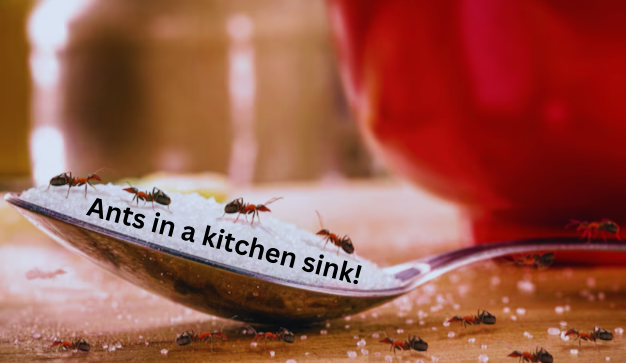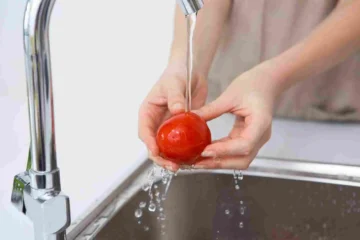To effectively get rid of small ants around your kitchen sink, the first and most effective step should be a thorough clean to eliminate food or water sources that attract them. Next, seal any cracks or entry points through which they could enter. Using natural repellents like vinegar, lemon juice or peppermint oil could deter future visits by the pest. For stubborn infestations that persist further investigation with bait ants (like boric acid) could target their nest directly and finally maintain an environment free from moisture to help avoid future outbreaks.
Table of Contents
Understanding the Problem: Why Are Ants Attracted to Your Kitchen Sink?
Before diving in with solutions, it’s essential to first identify why ants are coming together around your kitchen sink. Small sugar or odorous house ants tend to congregate there for various reasons:
Food Sources:
Ants are always looking for sustenance to feed on, particularly sugary or greasy substances like candy or grease, making your kitchen sink the ideal spot for them to search out spills, food scraps, and crumbs in search of sustenance.
Water source:
Ants require water for survival, and your kitchen sink often serves as an abundant supply. Leaks or standing water provide constant access for this purpose.
Easy access:
Ants gain easy entry to kitchens through cracks, gaps around pipes and other small openings in walls or floors – often heading straight for the sink area.
Step-by-Step Guide to Removing Ants Around a Kitchen Sink
1. Clean Thoroughly
The first step to eliminating ants around your sink should be eliminating their source of attraction: this means thoroughly cleaning your kitchen space.
Clean counters and sink: For an effective cleanse of counters and sink, warm soapy water or vinegar-based cleaner are effective tools in dislodging food residue, grease, and sticky spots from sink and surrounding surfaces.
Check for Crumbs: Make sure that any food debris such as crumbs from counters, under the sink and anywhere that ants could find food are cleared away regularly.
Fix Leaks: Ants tend to be drawn toward sources of water; check your sink and pipes for leaks that might attract them and repair any issues promptly if any are discovered.
ALSO READ: Why kitchen sink leaking from top?
Empty Your Trash: Before leaving home, empty all food waste from your pantry into the garbage can regularly to reduce food waste that attracts ants.
2. Seal Entry Points
Seal Entry Points Ants have the ability to sneak through even tiny cracks in your kitchen’s structure inspect carefully for cracks or holes as this could allow entry for them.
Conduct an inspection of your sink and surrounding areas: Look out for any cracks around pipes, faucets or edges of the sink where ants could potentially gain entrance; seal these gaps using silicone caulk if any gaps or openings exist.
Review Baseboards and Walls: Carefully review any openings along baseboards or walls where ants might gain entrance, to ensure no small openings exist where ants could gain access.

3. Use Natural Ant Repellants
If a non-toxic approach appeals to you, several natural ingredients have proven successful at repelling ants; try natural solutions instead: lavender essential oil is often effective; this option might work too
Vinegar and Water Solution: Combine equal parts white vinegar and water in a spray bottle and use it directly against ants or along their trails; the smell of vinegar should disrupt their scent trails and dissuade any future invaders.
Lemon Juice: Ants despise the citron scent of lemon. Squeezing fresh lemon juice around your sink area or placing lemon peels near places ants have been seen can deter them. A lemon-scented cleaner may also work.
Cinnamon or Cloves: Sprinkle ground cinnamon or whole cloves around your sink to deter ants with their strong aroma, helping them leave quickly. The strong smell will deter them as soon as they smell it!
Peppermint Oil: Combine some drops of peppermint oil with water in a spray bottle and apply liberally around entry points and areas where ants frequent. Ants find peppermint oil unpleasant, leading them to avoid these areas altogether.
4. Ant Baits and Traps
Ant baits provide an efficient method for eliminating the pest.
Gel Baits: When placing gel bait near the sink and along any trails of ants, place some near each sink as they will return back to their colonies and help eliminate the source of problems.
Bait Stations: Pre-filled bait stations can provide an efficient method for drawing ants towards poisoned bait stations in strategic spots around your kitchen where ants have been seen active. Place them strategically when seeing signs of activity.
5. Boric Acid and Diatomaceous Earth
If natural repellents and baits don’t seem effective enough for you, consider boric acid or diatomaceous earth as both have proven deadly to ants while being safe for both people and pets when applied correctly: both substances kill them without endangering human lives and pets when applied as directed:
Boric Acid: For effective colony elimination, mix boric acid with sugar to create a bait that attracts ants. Once consumed by them, boric acid will kill all of them instantly while simultaneously helping destroy their colony.
Diatomaceous Earth: Spread food-grade diatomaceous earth around your kitchen sink and along any known ant trails to break up their exoskeletons and cause dehydration and death in ants.
6. Keep Your Kitchen Dry
Ants are attracted by moisture. To deter their return, keep the kitchen as dry as possible: this may help deter their return.
Clean wet surfaces thoroughly: After using the sink or washing dishes, be sure to dry off all wet areas to rid of water sources and leaks under or around pipes that could provide access to an ongoing source of moisture for ants.
Fix plumbing leaks: Even small leaks under the sink or around pipes can provide a steady water source for ants. Repair any leaks promptly.
7. Consider Professional Pest Control
If all other methods fail and ants remain near your kitchen sink, professional pest control service might be your last resort. A trained technician can identify species of ants present as well as locate colonies before administering more effective solutions to clear up an infestation.
Preventing Future Ant Infestations
To Prevent Future Infestations Now that ants have been eliminated from your environment, take measures to stop future outbreaks:
- Clean your kitchen regularly to remove food scraps and crumbs that attract ants
- Seal any new cracks or gaps around the sink and other potential entryways,
- Quickly fix leaks when necessary and keep everything dry, especially at night when they may be more active.
- store food in airtight containers to reduce its attractiveness to ants.
Summary
To effectively rid yourself of small ants around your kitchen sink, start by thoroughly cleaning and sealing any food/water sources in the area. Next, seal any cracks or entry points around it while using natural repellents like vinegar or peppermint oil as natural deterrents against them. Ultimately ant baits with boric acid or diatomaceous earth may help target their colony while fixing leaks and wiping down wet surfaces can keep things dry, followed up with professional pest control for persistent issues if necessary. By taking these steps and maintaining a clean/damp environment over time you will prevent future outbreaks with more pest-free experiences!





